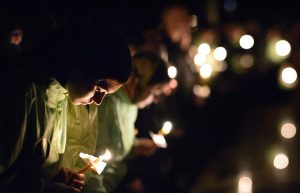There is a remarkable story in the book Everyday Saints related to fasting. Russian monks came to the Caucasus during the Chechen War to hear confessions of the local Orthodox flock and to give them communion. The organizers of the trip decided to arrange a thank-you meal for the priests. They cooked a fabulous meal with smoking hot heaps of roasted lamb meat and other delicious dishes. When the monks learned about the “surprise”, they were shocked. First, monks don’t eat meat at all. Secondly, it happened during the Great Lent, or more precisely, during the stringent days of the Holy Week. What could they do? The author writes that the monks immediately realized that their refusal would be a horrendous insult for the hosts. So they ate meat and drank wine, and that meal was the most joyful feast of love in their lives.
This story is totally fine both spiritually and from the point of view of common sense. The physical side of fasting can be disregarded even by monks if adherence to it can hurt anybody’s feelings. There are quite a few cases like those in the lives of the saints. We also face similar situation in our lives. However, the principle of “not hurting” our neighbor is often misused. That’s what I would like to delve into.
***
Sometimes I happen to hear that if a person is surrounded by people who don’t fast, he should give up fasting. The main argument in favor of this position is that you mustn’t make a show of your fasting. Indeed, our Lord teaches, “Moreover when ye fast, be not, as the hypocrites, of a sad countenance: for they disfigure their faces, that they may appear unto men to fast. Verily I say unto you, They have their reward. But thou, when thou fastest, anoint thine head, and wash thy face; that thou appear not unto men to fast, but unto thy Father which is in secret: and thy Father, which seeth in secret, shall reward thee openly.” (Matthew 6:16-18)
The prohibition to show off your fasting does not by any means imply that you should be bashful of the physical side of the fast and observe it only when no one can see you. Jesus says that it is wrong to appear fasting but He does not call us to stop fasting arbitrarily every time we meet an unbeliever. “Not showing off” and “concealing” are two different things. You mustn’t show off but it’s also wrong to “masquerade” as someone who doesn’t fast. Otherwise, it will appear as if we are lying. It sounds like, In fact, I don’t eat meat during the fast but I’ll pretend that I do when I meet my non-Christian colleagues. Why? It’s unclear.
It is also unclear how we will hurt our neighbor if we eat Lenten foods or abstain from non-Lenten dishes. With the sole exception of the case when our refusal to eat something will actually offend a certain person, why can’t we simply say that we are Orthodox and that we fast together with the entire Church? If the person you deal with is a normal sane person, they will respect your decision. It is wrong to break church commandments, even if they apply to a less important side of fasting, i.e., physical abstinence.
The Lord lays out the same principle with regard to alms-giving and prayer. Sure, you mustn’t show off your charity and prayer. It doesn’t mean that you shouldn’t make the sign of the cross when you pass by a church or that you shouldn’t give a coin to a beggar even if someone else can see you, does it? The Lord can see our intentions. Likewise, showing off and boasting about your fasting achievements is one thing, while obedience to the Church not only at home but also elsewhere is another thing. Naturally, we have to examine any given situation wisely in the spirit of Gospel-driven love.

***
The visibility and matter-of-factness of our fasting is our mission and apostolate in today’s world. Many people regard mockery of the Church and Her rules as the norm nowadays. Our testimony of staying loyal to the regulations of the Church can be a living sermon and apology of Christianity. Of course, it is significantly less convenient than hiding the fact of our fasting from the unbelievers and pretending to be a person who does not fast. Perhaps, we choose the more convenient model because we are afraid of defending our faith and don’t know how to talk about it?
If we aren’t Christians in name only, then our choice of a Lenten meal might prompt a conversation about spiritual issues. Even if it doesn’t yield any tangible result, at least the person you talked with will know that their colleague believes in God and honors church fasts. If they have any questions related to the Church and spiritual living in the future, they will contact us again.
***
We often forget about the sin of people pleasing when we talk about fasting. However, the Scripture tells us that God hath scattered the bones of those who please people (Ps. 53:5), and, We ought to obey God rather than men. (Acts 5:29). Don’t we cross the red line that divides our desire to be at peace with our neighbor and the sin of pleasing people, if we choose “not to fast openly”?
“The desire to maintain friendly relations with our neighbors sometimes turns to us its ugly side, i.e., the sin of people pleasing. As a matter of fact, the issue isn’t about friendly ties and the like. The issue is our own halfheartedness and reliance on someone else’s opinion. It is during the Great Lent that this passion manifests itself most vividly,” Nun Eugenia (Senchukova) writes.
Interestingly enough, a Jew or a Muslim wouldn’t even care what other people think about his fasting. You won’t be able to talk an Orthodox Jew or a Muslim into breaking the fast that millions of his brothers observe at the moment. They will never think that their fasting can hurt anyone. Granted, we Christians have a slightly different attitude to the fast but even in the Gospel, there is not a hint at fasting privately and stopping the fast when we’re in a public place. Apostle James warns us, “[K]now ye not that the friendship of the world is enmity with God? whosoever therefore will be a friend of the world is the enemy of God.” (James 4:4)
***
The proponents of giving up the fast to foreclose any discontentment of an unbelieving neighbor also put forth the danger of vainglory. There is an even trickier passion, though: being proud of not fasting. A publican who is proud that he isn’t a Pharisee… Have you thought about the danger of this kind of vainglory?
Generally, conceit and pride mingle with all virtues. St. John Climacus wrote, “Vainglory sticks to everything: I’m proud of myself when I fast but I am proud of my wisdom when I stop fasting to conceal my asceticism from other people; I am conquered by vanity when I wear fancy clothes but I am equally proud of myself when I wear bad clothes; when I open my mouth to talk, I am seized by pride, when I keep silent, I am proud, too. Whichever way you throw this trident, its sharp point will always look up.”
It doesn’t mean, however, that we should stop exercising our virtues. No, we should continue doing good but be extremely attentive to our inner disposition and repent of any symptoms of vainglory.

***
The Orthodox understanding of fast incorporates numerous components. For instance, it is meaningless to fast without prayer. Fasting is also void without alms-giving. It is no accident that the Sermon on the Mount lists three main Christian virtues: charity, prayer, and fast. They go hand in hand. Of course, we must remember the words of Prophet Isaiah, “Is it such a fast that I have chosen? a day for a man to afflict his soul? is it to bow down his head as a bulrush, and to spread sackcloth and ashes under him? wilt thou call this a fast, and an acceptable day to the Lord? Is not this the fast that I have chosen? to loose the bands of wickedness, to undo the heavy burdens, and to let the oppressed go free, and that ye break every yoke? Is it not to deal thy bread to the hungry, and that thou bring the poor that are cast out to thy house? when thou seest the naked, that thou cover him; and that thou hide not thyself from thine own flesh?” (Is. 58:5-7). We’ve got to remember all that. However, an attempt to take physical fasting away from this scheme is like causing a wall to collapse by taking a cornerstone out of it.
Certainly, physical abstinence is merely a means to an end. It provides a background that facilitates the acquisition of spiritual virtues. And yet, this practice is essential for any kind of spiritual struggle. That is why the list of passions compiled by the Holy Fathers mentions physical transgressions, namely gluttony and fornication, first. How do we fight these passions if we don’t follow the fasting rules prescribed by the Church, albeit abridged for lay folks?
“There is no repentance without fasting,” St. John Chrysostom used to say. He meant the simplest form of fasting, that is, abstaining from food. If we continue to adapt our lifestyle to that of the unbelievers, what will remain of our fasts? Jesus Christ fasted when necessary. The apostles fasted after the Ascension, too. We won’t find any saint (apart from some martyrs) who didn’t observe Church fasts. Do we expect to get saved by using a different approach?
***
I’m easily triggered by all kinds of legalism and hypocrisy, and I’ve written a lot about these issues. Unfortunately, I feel obliged to defend the physical side of the fast in view of several articles I’ve read during the last couple of years, especially by Greek authors. It seems to me that we often go too far in our attempts to “not offend” our neighbors. I keep hearing the following words: “Don’t pretend that you’re ascetics. Remember that you’re not monks; eat everything that people offer you. Orthodoxy isn’t a food-centric religion. ‘The kingdom of God is not meat and drink’ (Romans 14:17). Don’t be like Pharisees,” etc.
Don’t even dare mention the issue of sexual abstinence during the Great Lent, for heaven’s sake! Ridiculing and sneering at people who observe fast is considered good manners even in Christian circles. “Look at that simpleton who doesn’t know that fast is mainly about not devouring people.” Some Orthodox websites openly preach that physical asceticism was invented by monks and isn’t grounded in the Gospel. Well, and of course, they talk volumes about love and stuff. You can’t argue with that because you find yourself on an uneven playing field: what are you, a legalist?
How far can we go in our desire to excuse ourselves for being lazy and pleasing our bodies? We turn our backs to the simplest pledge for God’s sake—physical abstinence—and work hard to make it a thing of the past. As Saint Anatoly of Optina pointed out, “Practice… tells us, Spill your blood and receive the Spirit. Our reason tries to find a workaround so as to get the Spirit without spilling blood.” He nailed it, didn’t he?
We should work to find the perfect balance, always remembering the rule Spill your blood and receive the Spirit. May the Lord help everyone who fasts to understand and follow the commandment expressed by the following simple words that we find in the Gospel, “These ought ye to have done, and not to leave the other undone.” (Matthew 23:23).
By Sergei Komarov
Translated by The Catalog of Good Deeds

















